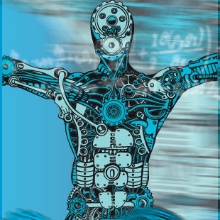In the invitation to tender "Regional Research Alliances Baden-Württemberg" issued by the Ministry for Science, Research and Arts, the University of Stuttgart and the University of Tübingen have jointly procured the project "The Human System: from the digital model to the application". Moreover, scientists from the Max-Planck-Institute for Biological Cybernetics and for Intelligent Systems as well as the Fraunhofer-Institute for Manufacturing Engineering and Automation are participating in the research alliance. A strategic basis for a longer-term cooperation between the involved partners is being established with this regional research alliance, which is to be continued and further expanded following the three-year funding by the Ministry for Science, Research and Arts at a total sum of one million Euros.
Through the interlinking of the complementary focal areas, both universities see a marked strengthening and through the system-oriented focussing on people a prioritisation with great future potential. Tübingen spokesperson of the new research alliance is Professor Wolfgang Rosenstiel, the Deacon of the Mathematics-Natural Sciences Faculty; Stuttgart spokesperson is Professor Frank Allgöwer from the Institute for Systems Theory and Control Engineering.
"This alliance is not only about understanding people better. The benefit of digitalisation for people becomes concrete and tangible in this alliance", according to Theresia Bauer, Minister for Science.
The human being is a highly complex biological system, which is characterised by an intelligent interaction of individual sub-units, finely tuned to each other. This dynamic interaction is considered to be energy-efficient, resilient to disturbance and highly integrated. The vision of the scientists in the cooperation is to achieve a profound understanding of the complex human system through system theoretic modelling. This should become useful as a model for the design of technical system. In addition approaches to new medical therapies open up by the susceptibility of the human system also being researched. The development of models of the human system that take into account the neuronal and in general the biological bases of human life, aims on the one hand to enable successful human-machine-interactions and on the other hand to fundamentally improve the diagnostics and therapy of disorders due to illness. Diseases of the central nervous system in particular are hereby paramount.
With the modelling approaches the researchers from the Universities of Stuttgart and Tübingen wish to contribute their respective strengths to the cooperation from the system sciences, computer science, biology and the experimental resp. therapeutic oriented medicine.
Expert Contact:
Professor Dr. Wolfgang Rosenstiel
University Tübingen
Mathematics-Natural Sciences Faculty
Telephone +49 7071 29-78090
wolfgang.rosenstiel@uni-tuebingen.de
Professor Dr. Frank Allgöwer
University of Stuttgart
Institute for Systems Theory and Control Engineering (IST)
Telephone + 49 711 685-67734
frank.allgower@ist.uni-stuttgart.de


